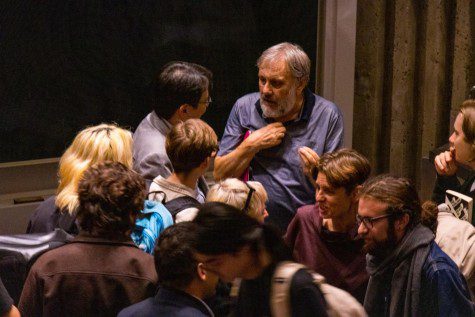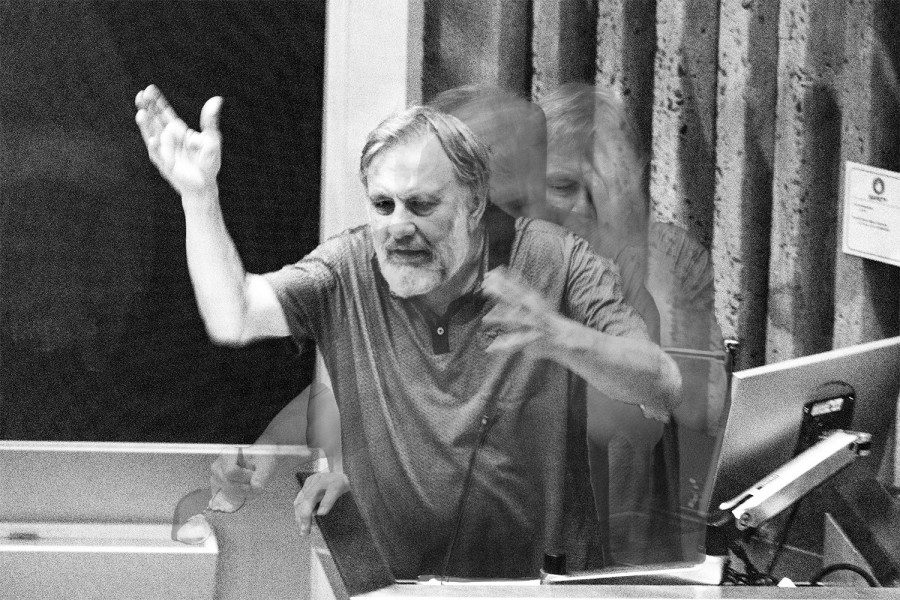Slavoj Žižek is the public intellectual for an absurd world
The oratory style of Slovenian philosopher Slavoj Žižek is as much performance as it is lecture.
Slavoj Žižek commands attention. (Photo illustration by Alex Tey for WSN)
November 6, 2022
To see Slavoj Žižek speak in person is equal parts entertainment and edification.
The 73-year-old Slovenian philosopher and writer delivered a delightful talk at NYU’s Meyer Hall on Nov. 3. He rambled, sputtered, embarked on syntactically convoluted tangents; he interrupted himself and fumbled with his notes. He was in peak form, and his audience was, for the most part, enthralled.
Žižek spoke to a generally young, generally rapt audience of about 200 on Thursday night. Most everyone in attendance had a notebook out. One older attendee doodled around the edges of a blank piece of paper, occasionally nodding off. He did not stay until the end.
Like a jazz musician alternating between an established melody and extended passages of virtuosic improvisation, Žižek briefly addressed the nominal topic of the event (an interpretation of current events as the four horsemen of the apocalypse) before going back to what he really wanted to talk about.
Žižek played all the hits, hammering home his signature arguments surrounding the works of thinkers like G.W.F. Hegel, Karl Marx, Sigmund Freud and Jacques Lacan. He spoke more or less nonstop over the course of the two-hour event.
The unrelenting monologue was propelled by his trademark tics: sniffing, of course, as well as plucking at his shirt, placing both hands over his eyes, wiggling his tongue between each corner of his mouth, and uttering phrases like “and so on.”
“Don’t underestimate the extent to which the big cultural war today is a war to return — which you cannot do, of course — to the old patriarchal morality, and so on,” Žižek said during the event hosted by NYU’s comparative literature department and poetics and theory program.
Žižek spent time discussing ideological conditions in Russia, Ukraine and the United States — briefly touching on the motherland he affectionately referred to as “my shithole of a country, Slovenia” — but he emphasized the worldwide nature of the struggle against what he called a new fundamentalism.
He said he identifies himself with the term “communist” to make the point that global issues require a globally coordinated leftist effort. Socialism, in Žižek’s view, does not cut it, while anarchism hardly deserves consideration. (Liberalism is off the table entirely.) Global cooperation or global war are the two outcomes he foresees. “I am more of a historical pessimist,” he said.
The fundamentalist ideology Žižek has dedicated himself to resisting doesn’t work without sexual obscenities, he says, and the philosopher did not shy away from the sexual obscenities on Thursday night. A world in which even the most intimate actions are supplanted by technology offers no shortage of amusing yet off-putting anecdotes, which Žižek enthusiastically recounted to the audience: two matched sex toys going at it on behalf of their human owners, for instance, or a pornographic performer who himself required pornography to remain engaged in his work.
He did not always provide such vulgar examples, however, though he drew laughs from the crowd regardless. He identified echoes of the same principles in written prayers that pray for you, paid mourners who weep for you, a TV show’s laugh track that laughs for you.
Among Žižek’s signature intellectual projects is the advancement of Lacan’s position that Freudian psychoanalysis still has a place in today’s world, in spite of the modern impulse to treat surface-level symptoms with medication or therapy. Psychoanalysis, Lacan and Žižek hold, in fact deserves elaborations that allow us to understand our deepest truths. “It is only today that the time of psychoanalysis has come,” Žižek wrote in his 2006 book “How to Read Lacan.”
For the uninitiated in the audience, much of Žižek’s monologue bordered on unintelligible. The devotees, however, roared with laughter at jokes whose punchlines required years of study to properly appreciate.
But Žižek isn’t exactly elitist. He expressed an enjoyment for “Don’t Worry Darling” (dir. Olivia Wilde), the 2022 film starring Florence Pugh, Harry Styles and Chris Pine, as part of a convoluted argument that did not quite land, though he did describe it as “the lowest of the lowest of my guilty pleasures.”
During the talk, Žižek occasionally bantered with Avital Ronell, who sat in the front row. Ronell is a personal friend of Žižek, a leading scholar of psychoanalysis and deconstructionism, and an NYU professor. (Ronell was also suspended by the university for the 2018-19 academic year over inappropriate verbal and physical contact toward a graduate student whom she advised.)
Žižek interrupted himself at one point to ask Ronell how much time he had left to speak. (“Where am I, temporally?” was his exact wording.) “Four more hours,” she quipped. The remaining allotted time was about half an hour, although Žižek would avail himself of another hour and fifteen minutes.

(Alex Tey for WSN)
Zhengzhi Jiang, an NYU junior double majoring in philosophy and cinema studies, credited Žižek with leading him down what he described as “this disastrous path of philosophy.”
While Jiang said that Lacanian approaches like Žižek’s are not especially popular in NYU’s philosophy department, he personally remains a fan. “No matter how possibly overrated he is, he’s still probably one of the best philosophers in the world living right now,” Jiang said.
“He’s the only successor of Lacan that exists in this world,” added Alice Lan, an NYU first-year studying computer science and game design.
Ian Szabo, a graduate student studying history at The New School for Social Research, said he had been engaging with Žižek’s ideas for some time. None of the subject matter covered on Thursday evening surprised him, but he enjoyed the show nonetheless.
“I was more looking forward to the vibe of being around Žižek,” Szabo said. “I knew exactly what he was going to say before he said anything, because he says the same things every time.”
Žižek seemed to understand that this performance was what most of the crowd was looking for. Several comparative literature students in attendance said they wished that Žižek had elaborated more rigorously on concepts like revolutionary defeatism as they applied to subjects like the Russia-Ukraine war.
But when Slavoj Žižek shows up to deliver a speech, his memetic popularity precedes him. Žižek impressions have over 73 million views on TikTok. His catchphrase “I would prefer not to” can be bought on mugs, posters and myriad T-shirts. This is to say nothing of the titanic impact of his actual intellectual work.
With these pressures in mind, enjoying a Žižek lecture requires a certain devotion.
“To understand Marxist theory, you already have to be engaged in it,” Žižek said at one point in the talk. “It’s the same with love,” he added, and the same with religion — once one understands it on an emotional level, the rational arguments come easily.
But until that intuitive understanding is reached, the logic is unconvincing, even inaccessible. Žižek himself — the man, the philosopher, the performer — is much the same.
Contact Alex Tey at [email protected].




























































































































































